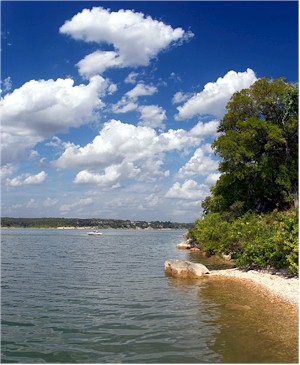|
Fishing Lake Belton |
Information
provided by the Texas Department of Wildlife
Lake
Belton is a popular lake for hybrid striped bass,
and can also be a good largemouth bass lake at certain
times of the year.
FISHING
COVER/STRUCTURE
Most of Lake Belton's
shoreline is very steep, rocky habitat. Majestic tall
bluffs and long rocky points are most common, although
sand and mud flats can be found up the Leon River and
Cowhouse arms. The lake has little or no aquatic
vegetation. Timber is also limited.
FISHING TIPS AND TACTICS
Largemouth bass
fishing is at its best from late February through April.
As the water temperature begins to rise, bass become more
active and prepare for the upcoming spawn. The backs of
creeks and coves, protected from the north wind, provide
the warmest water on the lake. Good creeks to target are
Cedar, Bear,  Owl,
Stampede, and Cowhouse. Spinnerbaits, plastic lizards,
jerkbaits, and jig and pork combinations are the preferred
baits. From May through September look for bass on
main-lake points and flats next to creek channels.
Stickbaits, chuggers, buzzbaits, crankbaits, and plastic
worms can all be productive under the right conditions.
From October through December, bass can be caught from the
same areas as during the spawn. Smallmouth bass are
generally caught from the dam to the Cedar Creek area at
mid-lake. Early spring and late fall, when the water
temperature ranges from 55 to 65 degrees, is the prime
time to target smallmouth. Spawning occurs in rocky coves
protected from the north wind. During summer and fall,
long, gently sloping rocky points are good areas to fish.
Deep diving crawfish-colored crankbaits, stickbaits,
chuggers, buzzbaits, grubs, and small jigs are usually the
most productive. Owl,
Stampede, and Cowhouse. Spinnerbaits, plastic lizards,
jerkbaits, and jig and pork combinations are the preferred
baits. From May through September look for bass on
main-lake points and flats next to creek channels.
Stickbaits, chuggers, buzzbaits, crankbaits, and plastic
worms can all be productive under the right conditions.
From October through December, bass can be caught from the
same areas as during the spawn. Smallmouth bass are
generally caught from the dam to the Cedar Creek area at
mid-lake. Early spring and late fall, when the water
temperature ranges from 55 to 65 degrees, is the prime
time to target smallmouth. Spawning occurs in rocky coves
protected from the north wind. During summer and fall,
long, gently sloping rocky points are good areas to fish.
Deep diving crawfish-colored crankbaits, stickbaits,
chuggers, buzzbaits, grubs, and small jigs are usually the
most productive.
Hybrid striped bass were first introduced to Lake
Belton in 1977. Since that time they have become a very
popular sportfish in the reservoir. Hybrid stripers tend
to travel in schools throughout the main lake. They can be
caught using a variety of methods, including bottom
fishing with live bait as well as trolling jigs and
crankbaits, with or without the aid of downriggers.
White bass fishing is best from March through May when
they migrate up the lake into the Leon River to spawn.
Bank or boat fishing from the Highway 36 bridge north to
Mother Neff State Park using small jigs or spinners can be
very productive. During summer and fall, white bass
sometimes school on the surface. White crappie
fishing is best between late February and the middle of
May. At this time, crappie move into shallow water in the
backs of creeks and protected main-lake coves. Spawning
crappie are fairly easy to catch on live minnows or small
jigs fished around stumps and submerged cover in 2 to 5
feet of water. In summer, fall, and winter, crappie can be
caught around large isolated trees and submerged brush in
water depths of 5 to 20 feet. Catfish are best in
the spring and summer. Channel cats spawn from May to
June, during which time they move into water 2 to 5 feet
deep in the backs of creeks or along flats just off the
river channel. Shad, shrimp, blood bait, and stink bait
all work just fine. Blue catfish were recently stocked
into the lake, but only time will tell whether a fishery
will develop
Location:
On the Leon River in Bell and Coryell counties, 5 miles
northwest of the City of Belton off FM 317
Size:
12,300 acres
Maximum Depth: 124 feet
Date
Impounded: 1954
Normal
Water Clarity: 4- to 6-foot visibility
Water Level
Fluctuation: 3-5 feet
Conservation Pool Elevation: 594 ft. msl
Aquatic
Vegetation: Very sparse buttonbush and cattail
|
|
|
|

|
|


